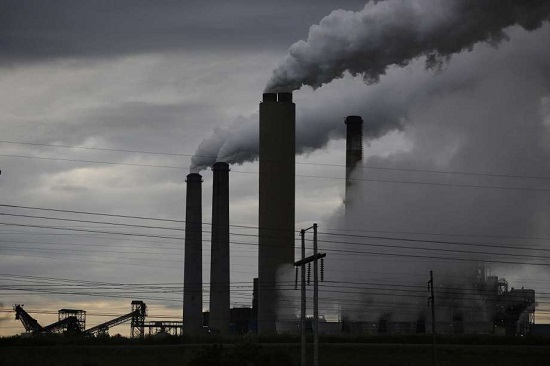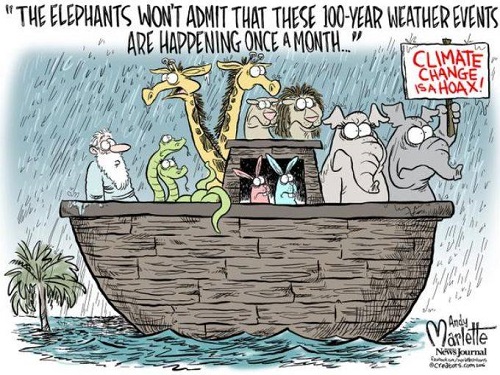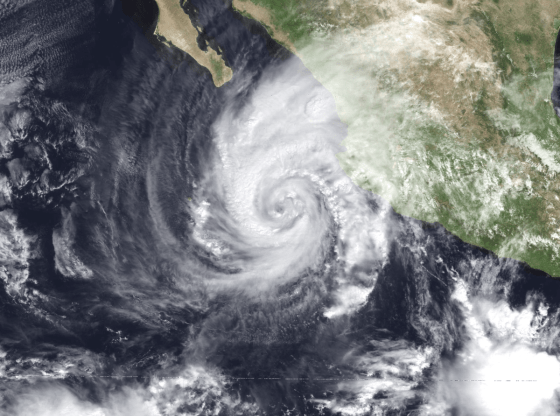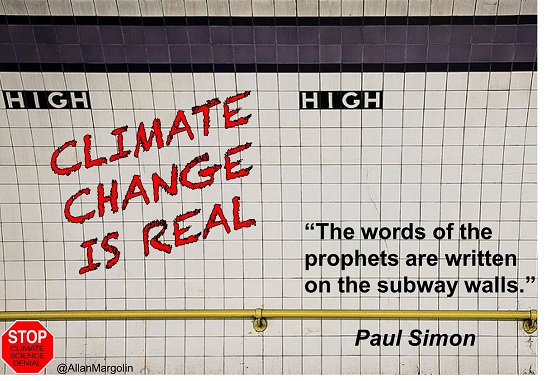2018 SkS Weekly Climate Change & Global Warming Digest #40
Posted on 7 October 2018 by John Hartz
Story of the Week... Opinion of the Week... SkS Highlights... Toon of the Week... Quote of the Week... Coming Soon on SkS... Poster of the Week... SkS Week in Review... Poster of the Week...
Story of the Week...
A major climate report will slam the door on wishful thinking
The IPCC is likely to say that even the most optimistic scenario for climate change isn’t great at all.

The leading international body of climate change researchers is preparing to release a major report Sunday night on the impacts of global warming and what it would take to cap warming at 1.5 degrees Celsius, or 2.7 degrees Fahrenheit, above pre-industrial levels, a goal that looks increasingly unlikely.
The report is from the Intergovernmental Panel on Climate Change, an international consortium of hundreds of climate researchers convened by the United Nations. Authors are meeting this week in Incheon, South Korea, to finalize their findings, but Climate Home News obtained an early leaked draft.
Why examine the prospects for limiting global warming to 1.5°C? Because under the Paris agreement, countries agreed that the goal should be to limit warming to below 2°C by 2100, with a nice-to-have target of capping warming at 1.5°C.
According to the drafts, the report finds that it would take a massive global effort, far more aggressive than any we’ve seen to date, to keep warming in line with 1.5°C — in part because we are already en route to 3°C of warming. And even if we hit the 1.5°C goal, the planet will still face massive, devastating changes. So it’s pretty grim.
But this is also a thunderous call to action, laying out what tools we have at our disposal (we have plenty) to mitigate global warming and to accelerate the turn toward cleaner energy. Let’s walk through the basics.
A major report will slam the door on wishful thinking by Umair Irfan, Energy & Environment, Vox, Oct 5, 2018
Opinion of the Week...
Climate change apathy, not denial, is the biggest threat to our planet
The easy way to cut emissions – closing coal power stations – is exhausted. Now the public has to be convinced to make sacrifices

Cutting emissions will depend on people changing how they live: flying less, for example.’ Photograph: Graeme Robertson for the Guardian
Three years after world leaders signed the Paris climate agreement, we’re about to better understand what that deal means for how we live our lives. On Monday, a major report from the UN’s climate science panel will set out what it will take to limit global warming to 1.5C, the key Paris target.
There are reasons to think the world is, finally, getting to grips with climate change. Carbon emissions are still rising but more slowly than before, and in many countries they’re falling. The UK has slashed its emissions to 19th-century levels, and we’re not alone – plenty of other countries, including the US, are making progress as well. Crucially, that’s happened without many people noticing, suggesting the world might be able to deal with the problem without having to persuade the public to change their polluting lifestyles.
But this is wishful thinking. The UK’s recent emissions cuts have mostly come from shutting coal power stations, which had few friends, and there aren’t many left to close. And that only happened after years of campaigning, but it was still much easier than what is to come. Cutting emissions further to stop dangerous warming will depend on people changing how they live: flying less and eating less meat and dairy, for example. There’s no way this can be done as quietly as what’s been achieved so far.
Climate change apathy, not denial, is the biggest threat to our planet, Opinion by Leo Barasi, Comment is Free, Guardian, Oct 5, 2018
Toon of the Week...

Quote of the Week...
Not Your Expected Climate Impact: Arizona Flooded by a Tropical Storm

Satellite images show then-Hurricane Rosa churning toward Mexico's Baja California and scientists say climate change is a big reason storms are taking unusual paths. Photo: Wikimedia
As Tropical Storm Rosa rolls through Arizona, dousing desert towns with heavy rains and filling reservoirs nearly depleted by a lengthy drought, the storm’s arrival is also a message from the sky about the impact of climate change: it can produce weird weather that in ancient times might have been attributed to angry gods.
Now, however, the unusual sight of flooded streets in Arizona can be explained by science.
“There’s a climate change component to it and we can say that with confidence,” said Kevin Trenberth, senior scientist at the National Center for Atmospheric Research.
Global warming has raised ocean temperatures and warmed the air above it, supercharging storms with moisture that they unleash in bigger rainfalls. Researchers now have enough data to connect the dots between increasing greenhouse gas emissions, greater moisture in the air and outsized rainstorms, Trenberth said.
The air above the ocean can hold 4 percent more moisture for every degree Fahrenheit and scientists have found about 5-20 percent more moisture gathered in the air since the 1970s, Trenberth said. The result played out last month when Hurricane Florence doused parts of the Carolinas with 30 inches of rain
“The main effects are the storms are more intense and last longer, and the rain is heavier. In Hurricane Florence, we have all three effects in play,” he said.
Not Your Expected Climate Impact: Arizona Flooded by a Tropical Storm by Ucilia Wang, Climate Liability News, Oct 2, 2018
Coming Soon on SkS...
- The Trump administration has entered Stage 5 climate denial (Dana)
- Next self-paced run of Denial101x starts on October 16 (Baerbel)
- SkS Analogy 14 - Inertia and Inevitability (Evan)
- Guest Post (John Abraham)
- New research this week (Ari)
- 2018 SkS Weekly Climate Change & Global Warming News Roundup #41 (John Hartz)
- 2018 SkS Weekly Climate Change & Global Warming News Roundup #41 (John Hartz)
Poster of the Week...

SkS Week in Review...
- 2018 SkS Weekly Climate Change & Global Warming News Roundup #40 by John Hartz
- New research, September 24-30, 2018 by Ari Jokimäki
- How Arctic lakes accelerate permafrost carbon losses by Ingmar Nitze, Guido Grosse, Thomas Schneider von Deimling & Katey Walter Anthony (Carbon Brief)
- New study finds incredibly high carbon pollution costs – especially for the US and India by Dana Nuccitelli (Climate Consensus - the 97%, Environment, Guardian)
- 2018 SkS Weekly Climate Change & Global Warming Digest #39 by John Hartz































 Arguments
Arguments






























Since the plough was invented, we have been releasing sequestered carbon into the atmosphere. Reading Plought Plagues and Petroleum by William F Ruddiman, it seems likely that this output of Carbon dioxide was just enough to hold off the slide into the next glacial period. Along came industrial civilization with too much of a good thing. The stable climate since the end of the recent glacial may have been due to the plough. Now we need to reverse this trend and get carbon back into the soils. Secondary benefits of doing this are huge. Fortunately there is a blue print in David R Montgomery's book, Growing a Revolution; Restoring our soils. His previous book, Dirt and sebsequent book, The Hidden Half of Nature rounds out the story.
Note that the term 'glacial period' was used instead of Ice Age. If we use 'ice age' for glacial periods like the previous one that extended from about 125,000 years ago (the Eemian) up until about 15,000 years ago, we will have to find a new term for the approximately 2.75m years we are still in, in which there have been about 30 glacial and interglacial periods.
For a detailed explanation of why this report is ridiculous, go here: http://arctic-news.blogspot.com/
[DB] That website has a history of exaggeration and promoting fearmongering.
Sunspot @3,
I would be more specific than the Moderator Response @3, and say that the particular web-page you link to at that website is exaggerating AGW.
One specific example is in the second point it sets out. We could all have a big bish-bash-bosh over where to set the pre-industrial global temperature-datum and what we mean by global temperature but the assertion is mad:-
The one thing that is very evident is that global temperatures have not been accelerating since the 1970s and maintain a remarkable linear rise since then. See here (usually 2 clicks to 'download your attachment') a graph demonstrating that linearity using HadCRUT4 - any other record will do the same. So the 'acceleration' is surely an 'exaggeration' of AGW.
Sunspot: About that so-called "ridiculous" IPCC Special Report on Global Warming of 1.5C...
The Summary for Policymakers of the Special Report on Global Warming of 1.5°C (SR15) is available at https://www.ipcc.ch/report/sr15 or www.ipcc.ch.
Key statistics of the Special Report on Global Warming of 1.5°C
91 authors from 44 citizenships and 40 countries of residence
- 14 Coordinating Lead Authors (CLAs)
- 60 Lead authors (LAs)
- 17 Review Editors (REs)
133 Contributing authors (CAs)
Over 6,000 cited references
A total of 42,001 expert and government review comments
(First Order Draft 12,895; Second Order Draft 25,476; Final Government Draft: 3,630)
"The likelihood of an Arctic Ocean free of sea ice in summer would be once per century with global warming of 1.5°C, compared with at least once per decade with 2°C." Directly from the IPCC report. So...if the temp goes up to 1.5C above baseline, the Arctic may be ice-free once per century. Once per decade for 2C. Huh? Once it melts completely, it will magically get colder the next year and refreeze, and stay frozen for the next 99, or 9, years? Ridiculous! This is the sort of utter nonsense Arctic Blogspot is pointing out. Just one example. Feel free to worship the IPCC. Read their earlier reports. WRONG. I'll stick with the real scientists at the Arctic Blogspot, who aren't afraid to tell the truth. I won't post about that site here ever again. I promise. You all can't handle the truth.
[JH] You state:
Please specify the IPCC report that you are referring to and provide a link to the page of that report where this statement is made.
As was pointed out to you previously, the use of all-caps is prohibited by the SKS Comments Policy.
The IPCC ignores feedbacks. The past temp change is linear because the feedbacks are just starting to kick in. We also know that it takes at least ten years for added CO2 to have its full effect. So warming has to continue just from the CO2 we have put there in the past decade. Every Climate Scientist knows about this effect. Yet it is ignored in the IPCC report.
[JH] You assert:
Please specify which IPCC report you are referring to.
Sunspot @7,
Your comment is rather confusing but you do appear to be saying that, rather than global temperature "is accelerating" (as that web-page you linked to @3 says) but "will be accelerating." The difference between "is" and "will be" is not trivial.
Beyond that, you appear to be linking the delays between a climate forcing and the resulting temperature rise with some unspecified feedbacks which you say are well known but ignored by the IPCC. That is a strong accusation to make.
It is possible to accuse the IPCC of not properly accounting for certain slow feedbacks. But that doesn't seem to be what youy re saying.
You seem to be saying that the IPCC ignores the most basic of feedbacks. And you do seem to misunderstand the reason why it takes time for a climate forcing to impact temperatures. The reason is the thermal inertia of the oceans. The surface waters take about a decade to warm with further warming taking a century or so as the deep ocean reacts that-much-more slowly to the cilmate forcing.
And all the time this decadal/century-long warming will involve feedbacks. So with today's level of increase in AGW forcing pretty-much at the same level it has been since the mid-1970s, or forty years ago, there has been plenty of time for feedbacks to kick in and start your alleged acceleration mechanism.
I hope this demonstrates why your accusations against the IPCC are too confused to be taken seriously. I suggest you need to be more specific as to what feedbacks you are referring to.
It's not hard to become a "denier" when the only facts shown are Anthropologic climate change ! There is much scientific data outside the elite scientific agenda of human induced change ! But alas that is never or quickly dismissed by the same obove mentioned group. This science is available to any who wish to read the truth about past pole shifts. Soooo, that is why myself and many like me discount your claims and dismiss them as you do ours.....
[DB] This is a science- and evidence-based forum. While you are welcome to your own opinions, any contentions expressed by participants that fall well outside accepted science must therefore be accompanied by credible evidence, typically in the form of published research appearing in peer-reviewed credible journals. So that burden falls largely upon you, in this instance.
For example, while the Earth's magnetic axis is shifting somewhat, Earth's rotational axis shifts only a little bit, mostly in response to the mass redistribution of water around the Earth from land-based ice sheet losses. This is a normal response.
The net change in the position of the Earth's rotational axis is about 37 feet. The largest annual change is about 7 inches.
If you move over 37 feet, the climate doesn't change. It changes even less per year if you only move 7 inches.
SOURCE 1
SOURCE 2
SOURCE 3 and SOURCE 4